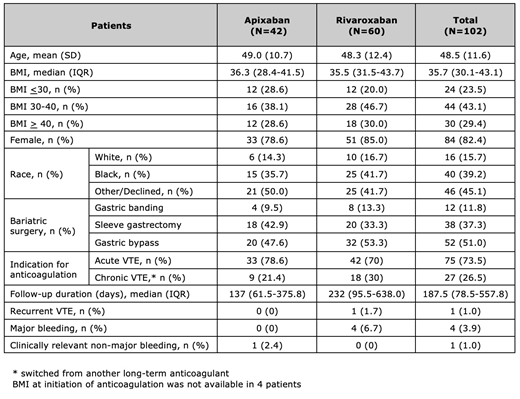Background: Over 200,000 people underwent weight loss surgery in the United States in 2017. The absorption of numerous drugs has been shown to be altered in patients after bariatric procedures, as gastrointestinal absorptive surface, food volume, and gastric pH all affect bioavailability. Dosing of warfarin, which is commonly used for the treatment of venous thromboembolism (VTE), often needs to be adjusted, based on INR, after bariatric surgery. Since direct oral anticoagulants (DOACs), which are rapidly replacing warfarin as standard anticoagulant therapy, are not monitored, there is concern regarding their efficacy and safety in patients who have had bariatric surgery, particularly rivaroxaban, which is absorbed primarily in the stomach and must be taken with food at therapeutic doses. One study found that 9 out of 9 apixaban patients (but only 2 of 7 rivaroxaban patients) had levels that fell within the expected range after bariatric surgery. Effects of bariatric surgery on DOACs may be further complicated by baseline obesity and subsequent weight loss of the patients. The goal of our current study is to determine whether DOACs are safe and effective in preventing recurrent VTE in patients who have undergone bariatric surgery.
Methods: Using our institutional database, we identified all adult patients (age ≥18 years) with a history of bariatric surgery (gastric banding, sleeve gastrectomy, and Roux-en-Y gastric bypass) who were started on anticoagulation with apixaban or rivaroxaban for VTE, between July 1, 2013 and June 30, 2018. We performed retrospective chart review to obtain information on patient demographics, BMI and type of bariatric surgery. We documented clinical outcomes of recurrent VTE and bleeding from the first prescription date to the earliest of a thrombotic event, discontinuation of medication, death, or the end of study period, June 30, 2018. VTE events were confirmed by a review of imaging studies (compression ultrasonography, ventilation/perfusions scans, and CT scans). Bleeding events were included if they met criteria for clinically relevant non-major bleeding and/or major bleeding according to the Subcommittee on Control of Anticoagulation of the Scientific and Standardization Committee of the International Society on Thrombosis and Haemostasis. Safety outcomes included major bleeding (MB) and clinically relevant non-major bleeding (CRNMB). We also compared VTE recurrence and bleeding rates between the post-bariatric surgery patients and patients with BMI >40 from our prior study. Chi- squared tests were used to assess statistical significance of the differences in recurrent VTE and bleeding rates between anticoagulant cohorts.
Results: Data on 102 patients were collected: 42 patients on apixaban and 60 patients on rivaroxaban. Our population was predominantly female (82.4%) with a mean age of 48.5 years and a median BMI of 35.7 at initiation of anticoagulation. Gastric bypass was the most common bariatric procedure (51%), followed by sleeve gastrectomy (37.3%), and gastric banding (11.8%). There were no recurrent VTE events in the apixaban cohort with a median follow-up duration of 137 days. Among patients on rivaroxaban, with a median follow-up of 232 days, there was one recurrent VTE (1.7%) in a patient with a BMI of 54 at the time of event. When we compared VTE recurrence rates of our combined DOAC cohort (apixaban + rivaroxaban) between our general morbidly obese population, from a prior study at our institution, and post-bariatric surgery patients, there was no statistically significant difference (2.0% vs. 1.0%, respectively, p=0.5). In bariatric surgery patients, one CRNMB event was recorded in apixaban group (2.4%) while 4 major bleeding events occurred on rivaroxaban (6.7%), p=0.3. There was no significant difference in the rate of composite MB and CRNMB between the general obesity and bariatric surgery patients (8.0% vs. 4.9%, respectively, p=0.3).
Conclusions: In a review of post-bariatric surgery patients on anticoagulation for VTE, we found low rates of recurrent VTE for patients on DOACs. Although we had a relatively small sample size, the incidence of VTE recurrence was not higher in this cohort than was found in our previously published study of general obesity population. Prospective studies are needed to further investigate the efficacy and safety of direct oral anticoagulants in patients after bariatric surgery.
Kushnir:Janssen Pharmaceuticals: Research Funding. Billett:Janssen: Research Funding.
Author notes
Asterisk with author names denotes non-ASH members.


This feature is available to Subscribers Only
Sign In or Create an Account Close Modal